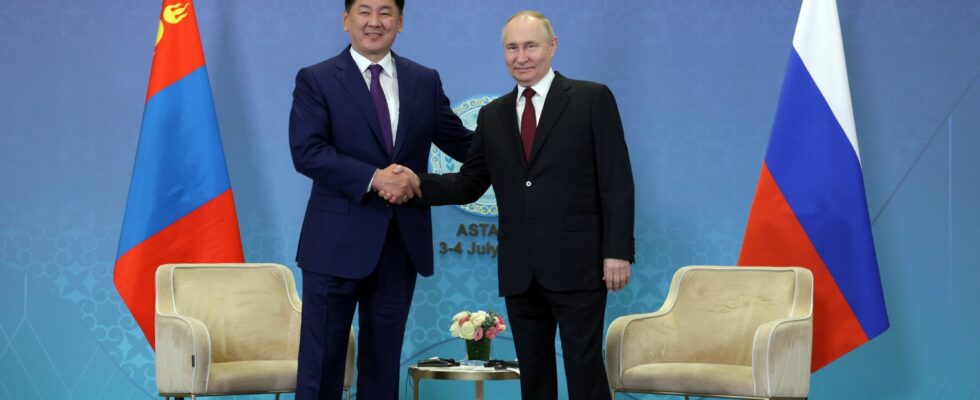A seemingly innocuous visit. Vladimir Putin “will make an official visit to Mongolia on September 3,” the Kremlin said in a statement on Thursday. A country where the Russian president last visited in September 2019, and where he is traveling this time “at the invitation of Mongolian President Ukhnaa Khurelsukh to participate in the celebrations of the 85th anniversary of the joint victory of the Soviet and Mongolian armed forces over the Japanese militarists” during the Battle of Khalkhin Gol.
But this visit has a very particular stake, far from the military commemorations of the Second World War. It is indeed the first trip of Vladimir Putin to a member state of the International Criminal Court (ICC) since the latter issued an arrest warrant against him in March 2023 for “illegal deportation” of Ukrainian children.
Mongolia has indeed been a signatory to the Rome Statute since 2000, the treaty governing the rules of the ICC, before ratifying it in 2002. However, each member state is required to arrest anyone on its soil who is the subject of an ICC arrest warrant, which is the case for Vladimir Putin. In principle, therefore, the country’s justice system is supposed to be obliged to arrest him as soon as the Russian president sets foot on Mongolian territory.
kyiv reacts, Moscow has no “concerns”
This was enough for Ukraine to step up to the plate and urge Mongolia to “execute the mandatory international arrest warrant and transfer (Vladimir) Putin to the International Criminal Court in The Hague,” kyiv said in a statement on Friday.
The Kremlin, for its part, has said it has “no concerns” about a possible arrest of Vladimir Putin. “We have an excellent dialogue with our Mongolian friends,” Russian presidential spokesman Dmitry Peskov told reporters. “Of course, all aspects of the visit have been carefully prepared,” he added, without giving further details. There is little doubt that Mongolia would not have invited the Russian autocrat to military commemorations without assuring him of his full and complete security throughout the trip.
The Russian and Mongolian leaders had also met very recently, on the sidelines of the Shanghai Cooperation Organization (SCO) summit on July 3 in Kazakhstan. A body largely dominated by China and having taken an anti-Western turn, promoted by Beijing and Moscow. A sign that Ulaanbaatar is far removed from the Western priorities of placing Vladimir Putin behind bars.
The Kremlin, which does not recognize the ICC, has always firmly rejected the accusations from The Hague against the Russian president. Nevertheless, Vladimir Putin had always taken care for almost a year and a half to avoid traveling abroad as much as possible, for example skipping the BRICS summit in South Africa in August 2023, then the G20 summit in India in September of the same year. On the other hand, he notably went to China last May, North Korea in June, and Azerbaijan in mid-August, none of these countries being members of the ICC.
A strategic visit
Beyond the symbolic challenge for the Kremlin to show that the ICC has no control over its movements, this visit to Mongolia also has strategic elements. Vladimir Putin and Ukhnaa Khurelsukh have planned meetings and “will discuss the prospects for the development of Russian-Mongolian relations”, according to the Kremlin. The two leaders “will exchange their points of view on current international and regional issues”, also added the Russian presidency, according to which “a certain number of bilateral documents” will be signed on this occasion.
Mongolia, a country rich in natural resources, is located in East Asia, landlocked between Russia and China, and has a vast territory (three times the size of metropolitan France). However, it has only 3.4 million inhabitants.
In early August, US Secretary of State Antony Blinken visited the Mongolian capital Ulaanbaatar to meet with “a central partner” of Washington in the region. This visit was part of a stated desire by the United States to increase its influence in this vast country, also coveted by its Russian and Chinese rivals. French President Emmanuel Macron also visited Mongolia in May 2023, with whom Paris wants to strengthen bilateral energy ties.
